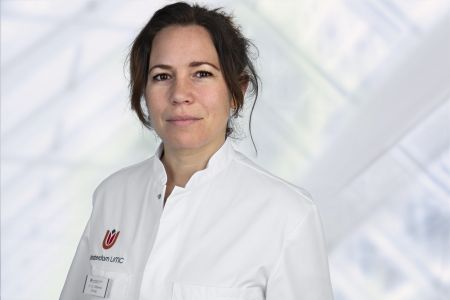Setting the stage
For a patient diagnosed with esophageal cancer, the first objective is to map any metastases to surrounding lymph nodes, known as staging. Lymph node metastases are the most important prognostic parameter in esophageal cancer. This information is used to create a personalized treatment program (i.e. individualization of radiotherapy fields and surgery). Getting it right is important because over-treatment can reduce quality of life, whereas under-treatment can result in increased morbidity or decreased survival.
Unfortunately, getting it right is tricky because current imaging technologies are not able to visualize lymph nodes metastasis reliably. We need a new approach. Therefore, Cancer Center Amsterdam Foundation is funding a research project called ‘Optimizing lymph node staging in esophageal cancer with USPIO-enhanced MRI’ to pursue better imaging techniques.
A picture is worth a thousand words
Dr. Suzanne Gisbertz and her team will evaluate a new non-invasive method of capturing images of esophageal cancer. They will use a 3 tesla magnet MRI machine and create contrast with ultra-small superparamagnetic iron oxide nanoparticles (USPIO-MRI). USPIO’s will be internalized by macrophages which accumulate in normal lymph nodes (black on iron sensitive MRI), but not metastatic lymph nodes (white on iron sensitive MRI). “We will then compare the USPIO-MRI to current imaging using PET-CT, as well as pathology results after the operation,” says Dr. Gisbertz. In addition, the applicability of USPIO-MRI for response evaluation after neoadjuvant therapy will be evaluated.
Seeing the target
“We expect that more accurate staging will lead to more targeted treatment with radiation fields and lymphadenectomy tailored to the individual patient,” says Dr. Gisbertz. “This will reduce morbidity and mortality and improve quality of life in patients that are now over treated, and improve survival in patients that are now under treated.”
 Dr. Suzanne Gisbertz, lead principal investigator
Dr. Suzanne Gisbertz, lead principal investigator
For more information contact Dr. Suzanne Gisbertz by email: s.s.gisbertz@amsterdamumc.nl
People involved at Cancer Center Amsterdam – Amsterdam UMC:
Dr Suzanne Gisbertz
Nannet Schuring, PhD student
Prof. Aart Nederveen, applied MR physics
Dr. O. Gurney-Champion, MR physics
Dr. Maarten Hulshof, radiation oncologist
Prof. Hanneke van Laarhoven, medical oncologist
Prof. Nicolle van Grieken, pathologist
Text by Lynita Howie

